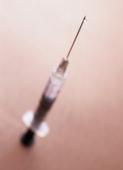- Could Your Grocery Store Meat Be Causing Recurring UTIs?
- Are You Making This Expensive Thermostat Error This Winter?
- Recognizing the Signs of Hypothyroidism
- 10 Strategies to Overcome Insomnia
- Could Artificial Sweeteners Be Aging the Brain Faster?
- Techniques for Soothing Your Nervous System
- Does the Water in Your House Smell Funny? Here’s Why
- Can a Daily Dose of Apple Cider Vinegar Actually Aid Weight Loss?
- 6 Health Beverages That Can Actually Spike Your Blood Sugar
- Treatment Options for Social Anxiety Disorder
5 Babies at Illinois Day Center Diagnosed With Measles


The number of measles cases in the United States continues to climb, with Illinois health officials saying five babies who attend a suburban Chicago day care center have come down with the highly infectious childhood disease.
Laboratory tests confirmed a measles diagnosis for two of the infants, all of whom are under 1 year old. Test results for the three other babies are pending, but a measles diagnosis was made based on their symptoms, according to a joint press release from Illinois and Cook County health officials.
All students, staffers and faculty members at the KinderCare
Learning Center in Palatine have been notified of the outbreak. Anyone who hasn’t had the MMR (measles, mumps, rubella) vaccine has been told to stay home and away from unvaccinated individuals for the next 21 days — the incubation period for measles, the health officials said.
The source of infection or whether it’s connected to the large outbreak traced to two Disney theme parks in southern California isn’t known at this time, the officials said.
On Monday, federal health officials said the number of measles cases in the United States had climbed to 102, with most of the cases part of the outbreak tied to the Disney parks.
The vast majority of U.S. cases have occurred in California and they involve people who weren’t vaccinated against the disease, officials said.
But cases have also been reported in 13 other states: Arizona, Colorado, Illinois, Minnesota, Michigan, Nebraska, New York, Oregon, Pennsylvania, South Dakota, Texas, Utah and Washington, according to the U.S. Centers for Disease Control and Prevention.
“The majority of the adults and children that are reported to us for which we have information did not get vaccinated, or don’t know whether they have been vaccinated,” Dr. Anne Schuchat, director of the CDC’s National Center for Immunization and Respiratory Diseases, said at a news conference last week. “This is not a problem of the measles vaccine not working. This is a problem of the measles vaccine not being used.”
Schuchat added, “We’ve already had a very large number of measles cases [in 2015] — as many cases as we have all year in typical years. This worries me, and I want to do everything possible to prevent measles from getting a foothold in the United States and becoming endemic again.”
The United States declared measles eliminated in 2000, meaning that the virus was no longer native to this country.
Public health officials said they’re particularly concerned because the current outbreak comes on the heels of the worst year for measles in the United States in two decades.
In 2014, there were more than 600 cases of measles, the most in 20 years. Many of the infected were people who contracted measles from travelers to the Philippines, where a massive outbreak of 50,000 cases had occurred, Schuchat explained.
Health officials aren’t sure how the current outbreak began. But Schuchat said that “we assume that someone got infected with measles overseas, visited the Disneyland parks and spread the disease to others.”
Parents whose children are not vaccinated against measles should get them immunized, Schuchat said, and adults who aren’t sure about their vaccination history should get a booster dose as well.
Many parents aren’t getting their children vaccinated against measles, due largely to what experts call mistaken fears about childhood vaccines.
A big contributing factor to the parents’ concerns about vaccine safety was a 1998 paper published and later retracted in the medical journal The Lancet. The study falsely suggested a link between the measles-mumps-rubella vaccine and autism. The lead author of that paper has since lost his medical license for having falsified his data.
Several dozen studies and a report from the Institute of Medicine have since found no link between autism and any vaccines, including the MMR vaccine.
Dr. Michael Tosi, chief of pediatric infectious diseases at the Kravis Children’s Hospital at Mount Sinai in New York City, said, “Any concerns or claims about a connection between measles vaccine and autism in young children have absolutely no scientific basis and have been entirely discredited.”
The American Academy of Pediatrics, the American Academy of Family Physicians and the CDC all recommend that children receive the MMR vaccine at age 12 to 15 months, and again at 4 to 6 years.
The most common side effects of the MMR vaccine are a fever and occasionally a mild rash. Some children may experience seizures from the fever, but experts say these seizures have no long-term negative effects.
According to the CDC, serious complications from measles can include pneumonia and encephalitis, which can lead to long-term deafness or brain damage. About two or three in every 1,000 cases of measles in children results in death, the agency said.
More information
Visit the U.S. Centers for Disease Control and Prevention for more on measles.
Source: HealthDay
Copyright © 2026 HealthDay. All rights reserved.










